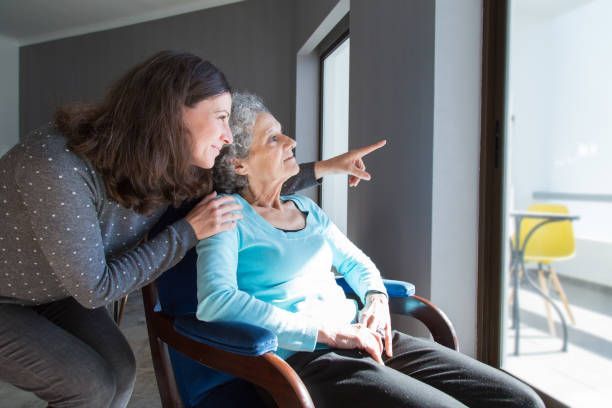
Providing the Same Level
of Care We Expect for
Our Own Family
(516) 408-0034
6 Key Risks of Memory Loss for Elderly Loved Ones at Home
6 Key Risks of Memory Loss for Elderly Loved Ones at Home
Memory loss in elderly individuals living at home poses significant risks, including safety hazards such as forgetting to turn off appliances, increased susceptibility to falls, medication errors, and social isolation that can exacerbate cognitive decline. These challenges often require specialized care and support to ensure the well-being of seniors. A home care agency that specializes in dementia care provides invaluable benefits, offering trained caregivers who understand the complexities of memory-related conditions. These professionals ensure a safe living environment, manage daily tasks, and provide companionship, helping seniors maintain their independence while reducing risks. With a focus on creating structured routines and personalized care, these agencies enhance the quality of life for both seniors and their families, offering peace of mind and expert support. 7 Day Home Care provides in-home care services in Manhattan, Queens, Brooklyn, Nassau County, and Suffolk County, New York. To learn more about our home care services, please call 516-408-0034.

Memory Loss is a Common Issue for Seniors
As our loved ones age, their health and safety become a top priority. Among the many challenges families face, managing memory loss can be one of the most difficult. Memory loss is a common issue for seniors, and its impact can range from mild forgetfulness to life-altering conditions like dementia or Alzheimer’s disease. While occasional lapses in memory are a normal part of aging, more persistent issues require attention and intervention to ensure the safety and well-being of elderly individuals living at home.
For seniors living independently, memory loss presents unique risks that can threaten their quality of life. This detailed guide from 7 Day Home Care highlights the challenges of memory loss, how to recognize the warning signs, and practical strategies to help seniors remain safe and supported in their homes.
What Is Memory Loss in Seniors? Understanding the Spectrum
Memory loss among seniors can vary significantly, from minor age-related forgetfulness to severe cognitive impairments requiring professional care. Understanding these differences helps families create appropriate support plans tailored to their loved ones’ needs.
Normal Aging
Normal aging involves occasional forgetfulness, such as misplacing items or forgetting names. These lapses are common and not a cause for alarm. Seniors experiencing normal aging can benefit from memory aids like notes, reminders, or organizational tools to stay on track.
Mild Cognitive Impairment (MCI)
MCI is characterized by noticeable memory issues that don’t yet interfere significantly with daily life but could progress into more severe conditions like dementia. Seniors with MCI might struggle to remember recent events or appointments and may require more structured routines to stay independent.
Dementia and Alzheimer’s Disease
Dementia, including Alzheimer’s, is a progressive condition that severely affects memory, problem-solving, and daily functioning. Unlike normal aging, dementia symptoms escalate over time, requiring comprehensive care and support to ensure safety.
By recognizing these distinctions, families can better prepare and respond to their loved ones’ needs.
The Risks of Memory Loss for Seniors Living at Home
Memory loss is more than a cognitive concern—it can significantly impact a senior’s safety, health, and overall quality of life. Below are the key risks associated with memory loss and actionable solutions to mitigate them.
1. Increased Risk of Accidents
Seniors with memory loss may forget essential safety precautions, leading to dangerous situations:
- Leaving appliances like the stove on could cause fires.
- Forgetting to lock doors or close windows increases vulnerability to theft.
- Misplacing mobility aids can raise the risk of falls.
Solutions:
- Install automatic shut-off devices for appliances.
- Use motion-sensor lighting and lockable doors and windows.
- Remove tripping hazards and place mobility aids within easy reach.
2. Medication Mismanagement
Memory loss often leads to missed doses, overdoses, or taking the wrong medication, which can have serious health consequences.
Solutions:
- Invest in a pill organizer with labeled compartments for each day of the week.
- Use electronic medication dispensers that provide reminders or alerts.
- Have a caregiver oversee medication schedules.
3. Social Isolation
Cognitive challenges can cause seniors to withdraw from social activities. They may feel embarrassed about their memory lapses or struggle to maintain relationships, leading to loneliness and depression.
Solutions:
- Schedule regular visits with family and friends.
- Encourage participation in senior centers or community programs.
- Explore virtual platforms for connecting with loved ones.
4. Financial Vulnerabilities
Seniors with memory issues are more susceptible to financial exploitation and mismanagement:
- Forgetting to pay bills may lead to service interruptions.
- Falling victim to scams targeting the elderly can result in financial losses.
- Mismanaging funds adds unnecessary stress.
Solutions:
- Assign financial responsibilities to a trusted family member or professional.
- Set up automatic payments for bills to avoid missed deadlines.
- Regularly monitor accounts for unusual activity.
5. Nutritional Deficiencies
Forgetting to eat, drink, or prepare meals can lead to malnutrition and dehydration.
Solutions:
- Arrange for meal delivery services tailored to dietary needs.
- Prepare easy-to-reheat meals in advance.
- Keep healthy snacks and drinks easily accessible.
6. Accelerated Cognitive Decline
Without mental stimulation, seniors with memory loss may experience faster cognitive decline.
Solutions:
- Encourage engaging activities such as puzzles, memory games, or crafts.
- Incorporate music therapy or light physical exercise into their daily routine.
- Provide books, audiobooks, or other materials that align with their interests.
Recognizing the Warning Signs of Risk
Families should be vigilant for signs that memory loss is becoming a serious concern:
- Frequently getting lost, even in familiar areas.
- Forgetting important tasks like eating or taking medications.
- Placing items in unsafe locations, such as leaving keys in the microwave.
- Difficulty managing daily tasks like dressing or cooking.
- Sudden changes in mood or personality, including irritability or anxiety.
If these signs occur regularly, it may be time to explore more intensive support options.
Strategies for Supporting Seniors with Memory Loss
1. Create a Safe and Navigable Home Environment
- Install grab bars in bathrooms and non-slip mats in frequently used areas.
- Label cabinets and drawers for easy identification.
- Use monitoring devices to track movement and alert caregivers.
2. Enhance Medication Management
- Set up reminders or alarms for taking medications.
- Consider having a caregiver monitor adherence to prescriptions.
3. Promote Social Engagement
- Organize regular family gatherings or outings.
- Enroll seniors in local activity programs or adult day care.
4. Ensure Proper Nutrition
- Use services like senior meal delivery programs.
- Stock up on nutrient-rich snacks and beverages.
5. Provide Cognitive Stimulation
- Incorporate games, reading, or creative activities into their routine.
- Explore therapies like music or art to improve mood and cognition.
6. Consider Professional Home Care Services
- Professional caregivers are trained to assist with daily tasks, monitor safety, and provide companionship, ensuring seniors with memory loss receive the support they need.
The Importance of Professional Home Care for Memory Loss
Professional home care services play a vital role in managing the complexities of memory loss. Trained caregivers provide:
- Safety Monitoring: Preventing accidents and ensuring a secure environment.
- Medication Oversight: Ensuring adherence to prescriptions.
- Companionship: Reducing feelings of loneliness and enhancing emotional well-being.
- Structured Routines: Promoting stability and minimizing confusion.
At 7 Day Home Care, our caregivers offer personalized care tailored to each client’s needs, providing peace of mind for families and improving seniors’ quality of life.
Memory loss in seniors is a challenging yet manageable condition. By understanding the risks, recognizing the warning signs, and implementing proactive strategies, families can help their loved ones remain safe and supported at home.
For professional and compassionate care, trust 7 Day Home Care. Our experienced caregivers are here to provide the personalized support your loved one deserves, ensuring their comfort, safety, and happiness. Contact us today to learn how we can help. 7 Day Home Care provides specialized in-home dementia care services in Manhattan, Queens, Brooklyn, Nassau County, and Suffolk County, New York. To learn more about our home care services, please call 516-408-0034.
Brian Callahan
7 Day Home Care










Hours of Operation
We are Open 24 Hours a Day
7 Days a Week
All Rights Reserved | 7 Day Home Care | Created by DAR Web Consulting